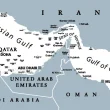I’ve been searching for the solution to the country’s economic crisis following the Covid-19 pandemic and finally found the answer in the keynote speech of Prof Madya Dr Aznan Hasan at the International Conference on Interdisciplinary and Strategic Studies (ICRIS) 2021 organised by IRIS Institute last Thursday, 21th August 2021. The conference that has chosen the theme of ‘sustainability and sovereignty of national resources’ has attracted participation from various countries.
The government can’t avoid to spend a huge amount of money in this pandemic and eventually raised the country’s level of debt. For instance, the government has to cover the treatment costs of Covid-19 patients, costs for the national immunisation program as well as the economic stimulus packages. Yet at the same time, the country’s fiscal health is deteriorating as it has suffered from prolonged fiscal deficit since 1998. This problem can be solved by some thoughtful suggestions made by this former advisor of Bank Negara.
The main agenda in achieveing sustainable fiscal position is the restructuring of fiscal reform that covers few aspects. The first aspect is increasing national income through effective tax collection as the main source of revenue. Specifically, higher tax income is not achieved by increasing tax rates but by encouraging and facilitating business growth that eventually reduce unemployment rate and increase tax revenue. Moreover, the government has to continue reducing its reliance on non-tax revenue such as petroleum-related revenues and dividend.
Dr Aznan also listed some suggestions of Tax Reform Committee:
- Reduce the tax gap, mainly in informal and hard-to-tax sectors as well as widening the tax base through digitalisation and effective enforcement activities.
- Reduce tax leakages by reviewing existing tax incentives and legislations.
- Explore new sources of sustainable tax revenue such as digital and environmental tax.
- Enhance tax administration by reviewing the legislation and simplifying administrative processes and procedures towards improving compliance.
The second aspect of a good fiscal policy is optimising government spending. According to this economist with vast experience as the advisor for central banks around the world, good management of government spending not just to cover the country’s operating expenditure such as paying the salaries and pensions of civil servants but can even provide return and generate income through investments. In Malaysia’s 2019 budget, government spending was still much focused on operating expenditure which was 83% of the budget compared to 17% for development expenditure. He also added that the reform must focus on public delivery system re-engineering, more targeted subsidies and social assistance, needs-based development projects as well as improved cost structure.
Dr Aznan also commented on the country’s high debt level. He explained that high debt level is not necessarily a problem as Singapore, Japan and America have debt to GDP ratio of more than 100%. Malaysia’s debt to GDP ratio is about 65% but the issue is how is the debt being used.The country’s fiscal gap can be reduced in the future if the debt is used for investment and generate income for the country.
In addition, Dr Aznan emphasized the importance of fiscal policy to consider Bumiputera agenda without neglecting others. Paying attention to Bumiputera as the majority of the population will ensure economic stability through inclusive wealth distribution and reduction of socioeconomic gap. In short, national resources need to be utilised not only to increase government revenue but more importantly to improve the wellbeing of the people.
Before ending his speech, the President of Association of Shariah Advisors in Islamic Finance (ASAS) highlighted the huge potential of Islamic financial instruments like zakat and waqf in developing the economy. For instance, the zakat collected during the prosperous or boom economic period before the pandemic started can now be used to increase assistance to muslims who are badly affected by the economic downturn in this pandemic. On the other hand, waqf not only has the potential to be used as a source of fund to cover government expenditure but also an investment instrument to drive economic growth.
Dr Aznan concluded that Malaysia has bright economic growth prospect if the pandemic is managed well. It is not impossible for Malaysia to achieve fiscal surplus given that his suggestions are taken seriously and all economic sectors can be reopened as soon as possible with our fast vaccination rate.
Dr Adilah Zafirah
Chief Columnist and IRIS Institute Researcher











